This post may contain affiliate links, meaning we get a commission at no cost to you if you decide to make a purchase. As an Amazon Associate, we earn a small commission on qualifying purchases.
As parents and speech-language pathologists we know how overwhelming the special education world can be. From reading dense paperwork to walking into a room full of professionals to advocating for their child, parents are faced with endless terms, acronyms, and definitions. Since special education paperwork season is upon us, we thought a quick, simple review of common IEP definitions and terms was fitting. (And btw, we are not special education lawyers! We are just sharing what we know from our professional experiences!) So to help out all you fellow mamas, we are explaining 12 Need to Know IEP Definitions.
- Individual Education Plan (IEP)
- Eligibility
- Local Education Agency Representative (LEA Rep)
- Related Services
- Present Levels of Performance
- Goals/Benchmarks
- Accommodations/Modifications
- Least Restrictive Environment (LRE)
- Extended School Year (ESY)
- Assistive Technology (AT)
- Functional Behavior Assessment (FBA)/Behavior Intervention Plan (BIP)
- Response to Intervention (RTI)
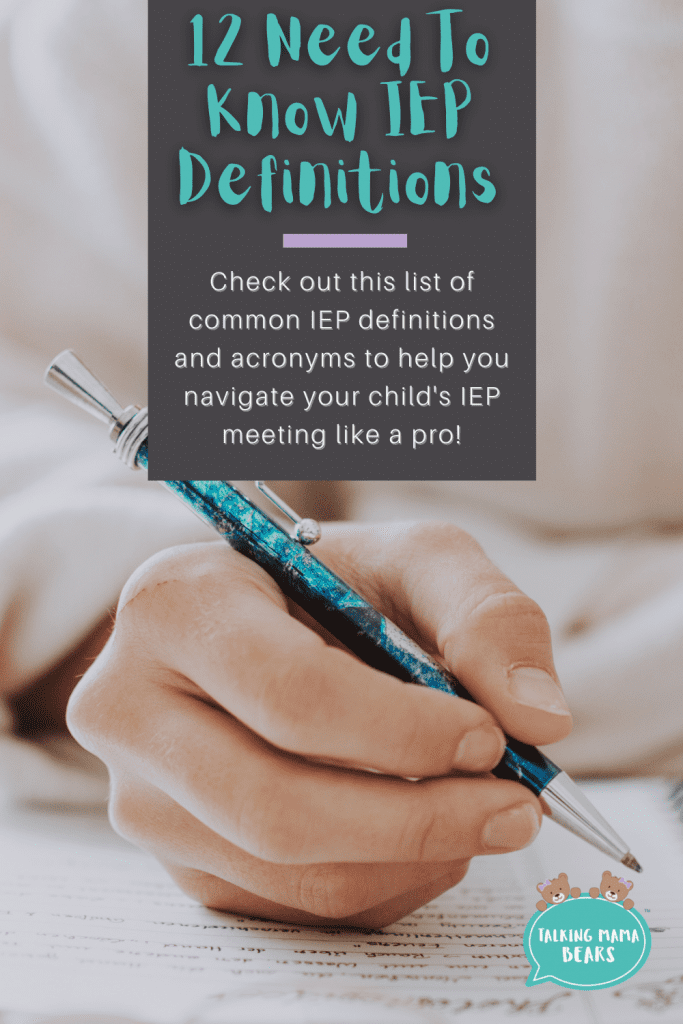
Individual Education Plan (IEP)
First up, the most frequently heard term in special education has to be Individual Education Plan, or IEP. An IEP is a legal document that states the appropriate services and supports for a student with special education needs. Basically, think of an IEP as a roadmap to your child’s academic supports and access to their school environment.
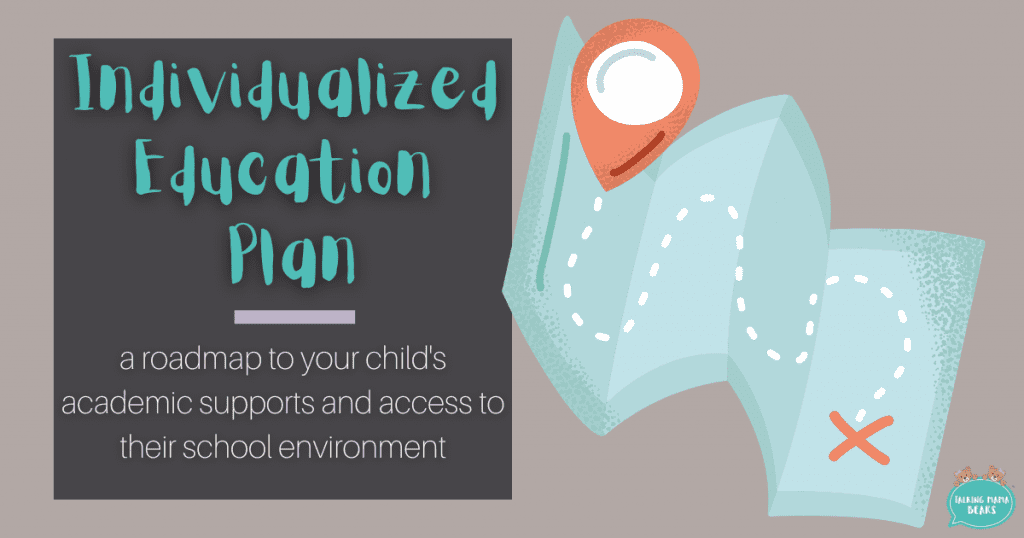
Just as the name implies, this document is specifically written for each student. To do this, the special education team meets to discuss the specific needs of the student. This team may consist of a school psychologist, general education teacher, special education teacher, speech-language pathologist, social worker, occupational therapist, physical therapist, school nurse, hearing or vision specialist, AND the parent or legal guardian. An IEP meeting happens at least once a year (typically called an annual review), but parents are able to request an IEP meeting at any time.
Eligibility
In order to receive services via an IEP, a student must first be determined eligible. A student is eligible for services when their academic or functional performance at school is adversely affected. There are many different eligibility areas in which they can qualify for special education services. These areas include: Autism, Deaf-Blindness, Deafness, Emotional Disturbance, Hearing Impairment, Intellectual Disability, Multiple Disabilities, Orthopedic Impairment, Other Health Impairment, Specific Learning Disability, Speech/Language Impairment, Traumatic Brain Injury, and Visual Impairment. Please note an educational eligibility is not a medical diagnosis, but can take into consideration any diagnosis a student may currently have.
Information is gathered through formal evaluations to decide on the most appropriate eligibility. No later than every three years, a student’s eligibility is reexamined via a re-evaluation. Parent consent should always be obtained prior to conducting any formal assessments.
Local Education Agency Representative
(LEA Rep)
During the special education process, there are lots of people around the table…literally and figuratively! A Local Education Agency Representative, or LEA Rep, is a member of the team who is qualified to oversee the IEP process. In simpler terms, an LEA Rep is able to speak to all of the supports and resources available through the district to specifically help each individual student. Don’t hesitate to ask the LEA Rep any questions you may have about the special education process or IEP services. They can help you navigate this journey!
On the IEP paperwork, the LEA Rep will be indicated, so you will know who is representing the district in that role at the meeting. All other team members’ names and roles will be listed as well!
Related Services
We may be a bit partial to this IEP term as speech and language is often considered a related service! Related services are supports provided in but not limited to the areas of speech-language, occupational therapy, social work, hearing, vision, and physical therapy. Related service providers write a goal, determine minutes of service, and provide updates. Please note that most related service minutes are provided per month.
Present Levels of Performance
So this next term is often the meat and potatoes of the IEP meeting and explains how the student is currently functioning. Present Levels of Performance are detailed descriptions of the student’s academic (reading, writing, math, and social studies/science) and functional (communication, social, fine and gross motor, work habits, and medical) skills. These descriptions will contain data from assessments, teacher observations, and much more.
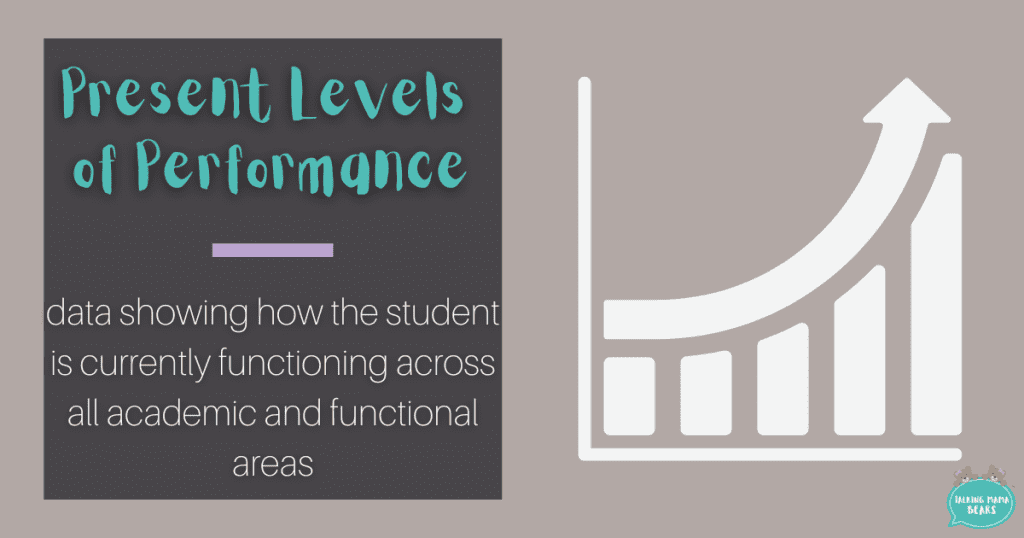
All strengths and weakness are discussed in addition to how the student’s disability affects their participation or access to the general education curriculum. Present Levels of Performance may be referred to by several different acronyms such as PLP, PLOP or PLAAFP.
Goals/Benchmarks
Following the review of current functioning, the team will introduce goals in order to target the identified areas of need. Each goal is broken down into smaller benchmarks laying out exactly what skill will be worked on and how data will be collected/measured to monitor growth. Keep in mind goals are written for one calendar year, not one academic year. Parents will receive updates on all IEP goals and benchmarks throughout the year but can request additional updates if needed.
See an example of a speech and language goal below as well as a reading comprehension goal and benchmark.
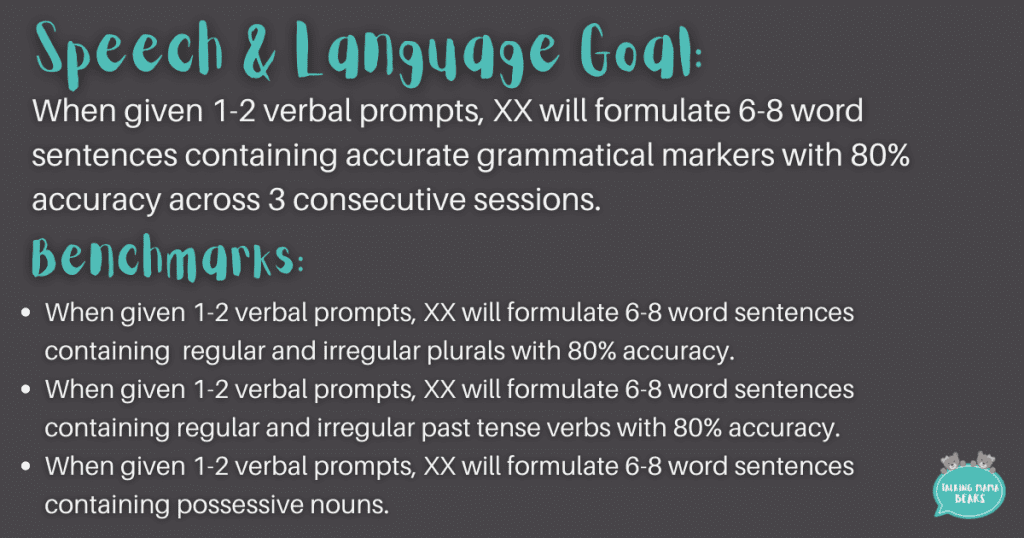
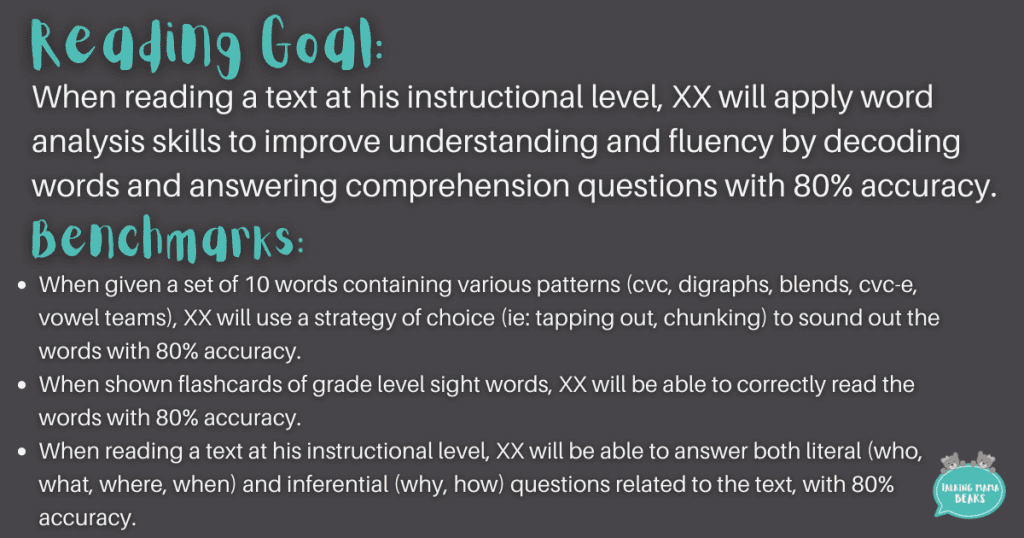
Accommodations/Modifications
To further help students within the classroom, the IEP team may recommend accommodations and modifications. These recommendations can help a student better access the general education curriculum. More specifically, accommodations help a student learn the same material that peers are, but in a slightly different manner. For example, a student who has a difficult time focusing may sit closer to the teacher or at the front of the room but is still expected to participate fully and complete all assignments. Modifications are changes to the actual curriculum or material being covered in class. A student, who is performing below grade level expectations, may benefit from shortened assignments or simpler directions on a test.
Least Restrictive Environment (LRE)
This next definition is very important, but may not be widely discussed in length during an IEP meeting. The Least Restrictive Environment, or LRE, simply means that students that receive special education should be with their general education peers as much as possible while still appropriately targeting their deficit areas. The LRE is not a physical place but more of a discussion to decide which educational setting is best.
Extended School Year (ESY)
Extended School Year, or ESY, is designed to help students who show a regression or loss of skills over winter, spring or summer breaks. Students who qualify for ESY can attend additional schooling during the summer months to target their current IEP goals and benchmarks. These additional services are provided by special education teachers and related service providers. Most school districts offer a variety of summer programs and enrichment open to all students, but a student must qualify for ESY special education services.
Assistive Technology (AT)
This IEP definition could almost have its own blog post…maybe another time! But for a quick definition, Assistive Technology, or AT, refers to any type of augmentative communication device a student utilizes throughout their school day. AT can range from low-tech options, such as pictures or core word boards, to high-tech options, such as communication applications used via an iPad. If a student requires AT to communicate, the type of device will be listed in the IEP.
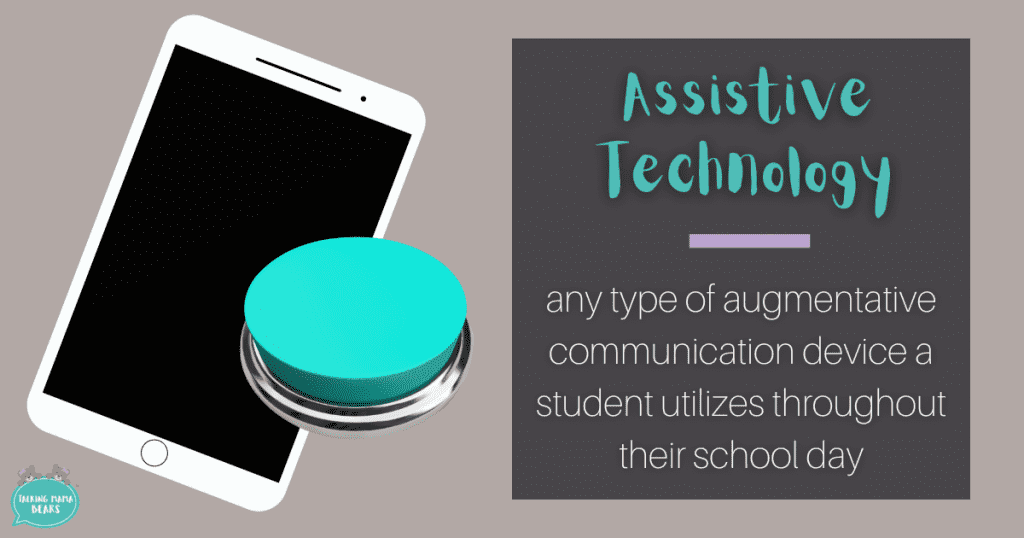
An AT device can go back and forth between the home and school environment. In addition, any preferred or frequently used words should be added to the device. The IEP team, speech-language pathologist and parents should work together to determine which words should be included.
Functional Behavior Assessment (FBA)/Behavior Intervention Plan (BIP)
In addition to academic areas of needs, sometimes a student requires supports for challenging or inappropriate behaviors in the school setting. Once receiving parental input and consent, the IEP team may meet to identify the specific behaviors and determine how those behaviors impact the student’s learning. This process is called a Functional Behavior Assessment, or FBA. Once the FBA has been completed, then a Behavior Intervention Plan, or BIP, is put into place to decrease inappropriate behaviors and replace with a more appropriate behavior. The FBA and BIP are parts of the formal IEP paperwork.
Response to Intervention (RTI)
The last definition we are covering isn’t necessarily a formal IEP term but more of a term used leading up to the initial special education process. Response to Intervention, or RTI, is the process of providing academic or behavioral supports to students who are struggling, but who are not yet identified as needing special education supports. Intervention is provided to help struggling students increase their rate of learning. These supports are documented and are often included in the initial special education process to show a growing skill deficit over time.
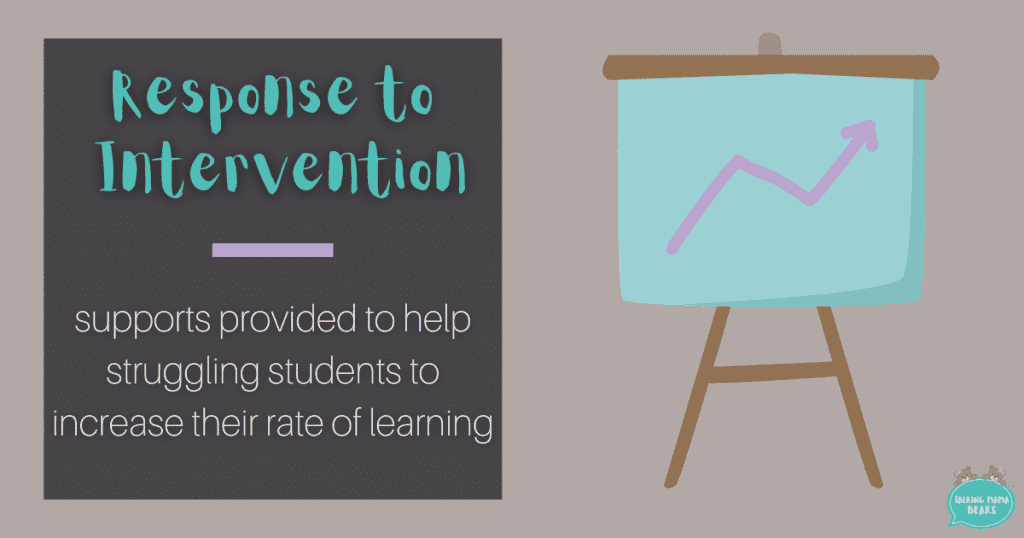
Again we are not special education lawyers or experts, but we hope sharing these IEP definitions helps ease some of the burden as you navigate your child’s special education journey. For more in depth definitions, check out the Individual with Disabilities Education Act or IDEA website. If you have any additional questions, concerns, or feelings of unease, we encourage you to reach out to your child’s district special education director or LEA representative for further clarification. Just remember YOU are a vital team member as well!
While this list is by no means exhaustive, please know there are MANY more terms and words out there! Are there terms or words you are still unsure of? Do you have additional terms in mind that you would like us to define? Drop us a comment below and let us know what we can further explain!
Happy IEP Season, fellow SLPs and mamas!
Talking Mama Bears